The pigeon, also called the wild rock pigeon or rock dove (or Columba livia domestica), has been around for thousands of years and is revered in many religions as a symbol of peace or other sacred sign.
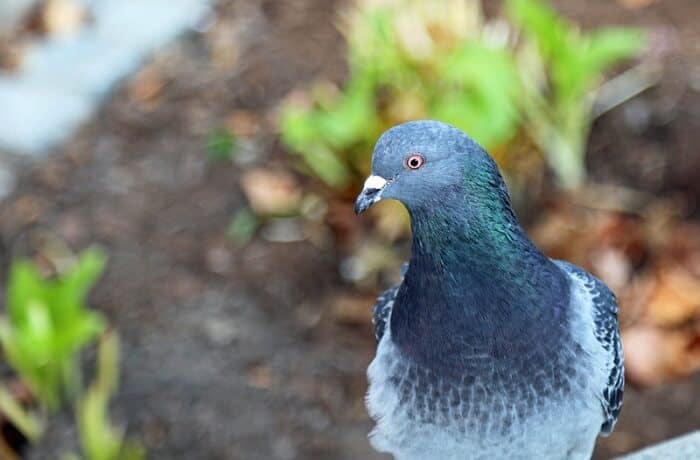
While many people see pigeons as pests that overrun the city and poop everywhere (if this is a problem for you read our article on how to clean up pigeon poop!), others enjoy their company and keep them as pets.
Domestic pigeons and doves are a bit different than their feral counterparts but make great companions because they are quiet and mild-mannered and easy to care for.
If you’re interested in pet pigeons of your own, check out this guide with everything you need to know about them.
Kinds of Domestic Pigeons
There are three main types of pigeons which would be called domestic, their purpose determines which kind they are.
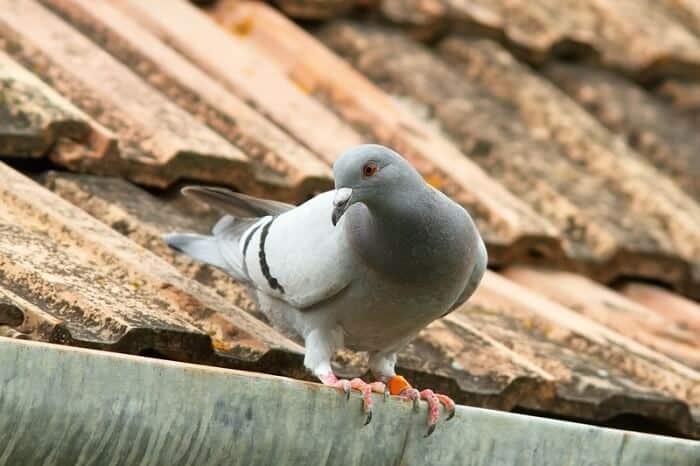
Keep in mind that all domiciliary pigeons are essentially the same, but people domesticate them for various reasons and having pigeons as pets has become an increasingly popular hobby around the world.
The first type is the flier, which is the type used as a homing pigeon or carrier pigeon.
Another type is the fancy breed, which is generally bred for show reasons.
The utility pigeon is the one that’s produced to prevent extinction and keep the species going.
Of course, you may just have a pet pigeon because you want one and not because you’re going to put it to work in any of these ways.
What Does a Domestic Pigeon Look Like?
A domestic pigeon looks the same as one that lives in the wild, that is they have a grey body, sometimes with iridescent purple or green feathers in the neck area.
They also have a black band of feathers on their tails and pink feet and legs.
However, there are a few color variations that occur with pigeons so they might also be tan, white, black or a combination of these colors.
Mature pigeons have red eyes, while juveniles retain the brownish color until they are fully mature.
Be aware that despite the fact that they look the same you should never take a wild pigeon in as a pet, this will not work out well for you or the pigeon.
Sounds a Pigeon Makes
One of the reasons why people enjoy keeping pigeons as pets is because they make a quiet cooing sound, unlike many other bird species which have loud squawking calls.
Your pigeon may “talk” a lot, but the sound isn’t too loud and can even be comforting.
When pigeons take flight, their wing tips touch so you’ll hear a clicking sound if you allow your pigeon to fly around the house.
Your pigeon’s feet might also make a tapping sound if it walks on hardwood or tile floors in your house.
Diet of a Domestic Pigeon
As a pigeon owner, you can provide your bird with the optimal diet for good health, which keeps your pigeon healthy and happy and also increases its lifespan.
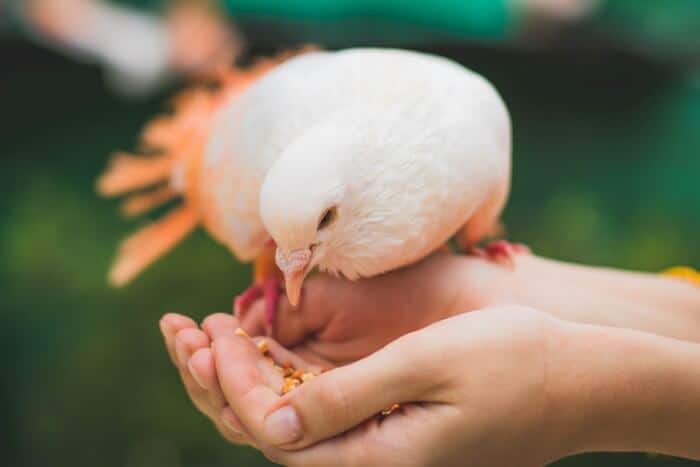
The main component of a domestic pigeon’s diet is seeds and grains. The best way to ensure that your pigeon is getting the appropriate amount of vitamins and minerals is to offer a variety of seeds and grains.
You can mix them yourself or buy a mixed seed bag at the pet store. Pigeon pellets are also a good supplement in your pigeon’s diet.
Your pet bird will also need a protein source, such as insects, snails and slugs, and you can offer soft fruits and vegetables as well.
Avoid feeding your pigeon avocados because they can be toxic and skip bread, except for a treat because it’s not nutritious enough and takes up space in your pigeon’s stomach so there’s little room for healthy food.
You also want to be sure your pigeon has access to a fresh, clean water source at all times.
Your Pigeon’s Personality
Pigeons are very sociable creatures and you might notice that your pet bird likes to be around you and interact with you.
Because pigeons enjoy the company of other pigeons, you might consider having more than one as a pet so they can be around others of their kind.
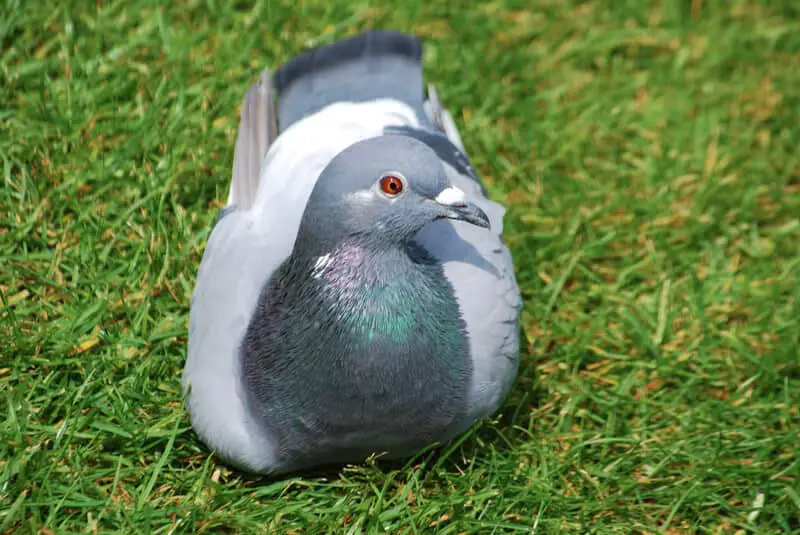
In the wild, pigeons eat, nest and roost with other pigeons so you can mimic this lifestyle by having several pigeons in your coop or cage.
You will also enjoy spending time talking to and playing with your pigeon as your pet will also be enjoying it so much.
How Does a Pigeon Spend its Day?
Feral pigeons spend a lot of their time looking for food, their domestic counterparts have a much more laid-back lifestyle.
Since they don’t have to forage for their meals, they have more time to do other things. One activity that pigeons enjoy is sunbathing so give your pet bird plenty of opportunities to lounge in the sunshine, whether it’s in a window in your house or out in the yard.
Pigeons also spend time during the day preening, interacting with other pigeons and sleeping.
You will notice that your pigeon probably has a routine that it adheres to and you can encourage that by allowing it to happen naturally.
Pigeon Reproduction
If you decide to allow your pigeons to breed, you should know how it works so you can help it happen naturally and seamlessly.
Pigeon pairs mate for life and stay monogamous to one another until one of the two dies. A male will show its interest in a female by strutting around to get her attention.
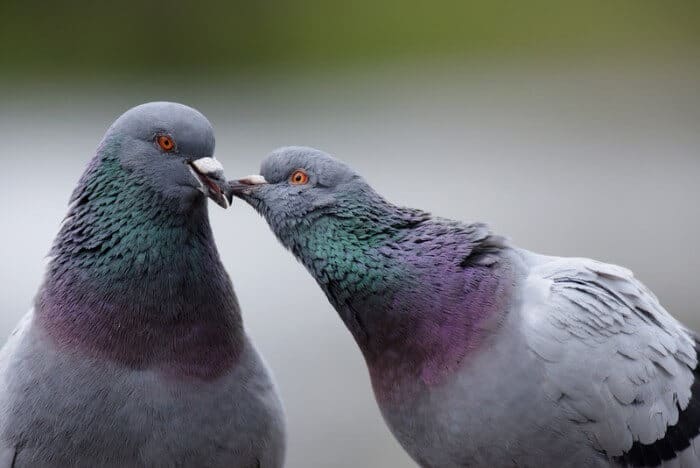
Once they pair up, the parent pigeons build a nest together. The female usually lays two eggs in each brood and the mother and father take turns incubating the eggs throughout the days.
After about 18 days, the babies hatch and both the mother and father pigeon feed and care for the hatchlings until they are ready to leave the nest.
Unlike many other types of bird species, pigeon babies remain in the nest until they are grown and look almost identical to the parent pigeons.
Pigeons reach sexual maturity around seven months of age, but generally don’t reproduce until they are about one year of age. Keep this in mind if you plan to breed your pigeons.
Starting too soon could mean only getting one egg at a time rather than two.
Predators of the Domestic Pigeon
In the wild, the biggest threat to pigeons is humans, followed closely by the peregrine falcon.
If you allow your pigeons to spend time outdoors, you’ll also need to be on the lookout for raccoons, rats, weasels, opossums and foxes, who will also eat pigeons if given the chance.
If you live in a rural area, falcons and hawks may hunt your pigeons as well.
How Long will My Domestic Pigeon Live?
Pigeons kept in captivity naturally have a longer lifespan than feral pigeons. This is because they are protected and watched over so the chance of being hunted is much lower.
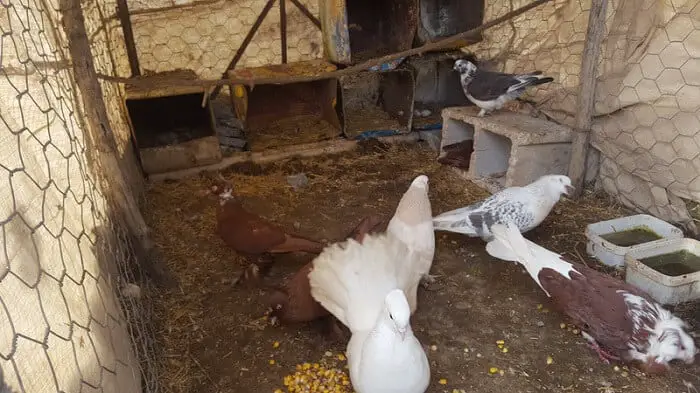
The average feral pigeon could live anywhere between three and five years. A domestic pigeon, on the other hand, may live up to 15 years.
Keeping your pet pigeon healthy is the best way to ensure a long life, which includes having it checked by a veterinarian trained in caring for birds, on a regular basis.
Keeping Your Pet Pigeon Safe
As mentioned above, if you keep your pigeons outside, you’ll need to make sure you buy them a secure and safe loft or coop to prevent predators from gaining entry and hunting them.
Of course, you should also keep your eyes on your pigeon when they are out of their home so that they aren’t encountering any dangerous objects or situations as they move about.
Provide a clean place for them to sleep and rest and ensure that food and water are always available.
Preventing Conflict Between Your Pigeons
If you decide to keep more than one pigeon as a pet, you’ll need to ensure that they aren’t fighting or getting into altercations with one another.
Generally, pigeons are friendly and enjoy interacting with one another. However, there can sometimes be conflict, usually over territory or mates. When this happens, you’ll need to step in to prevent injuries or deaths among your pigeons.
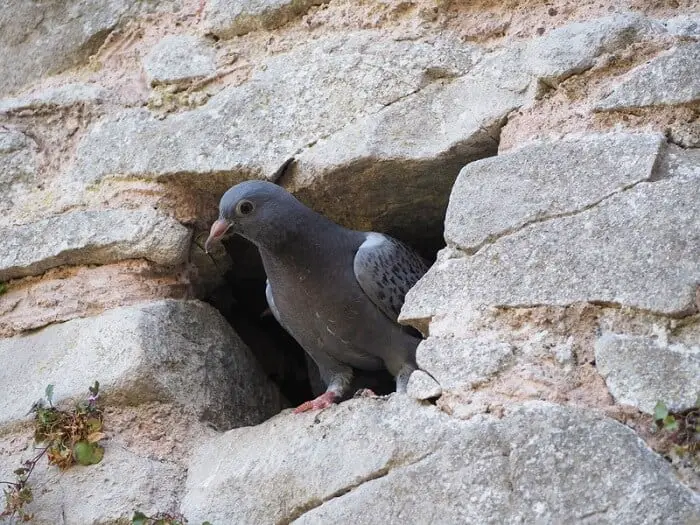
Place barriers to keep the fighting pigeons away from each other. Don’t let your pigeons scuffle for food or water.
Make sure they all get access without having to battle one another for resources.
Keeping droppings cleaned up can help eliminate territorial issues from occurring among your pet pigeons.
Tips for Caring for Your Domestic Pigeon
Keeping domestic pigeons takes time so be sure you’re ready to commit to socializing with your birds, feeding them, making sure they get enough physical activity and are healthy.
You’ll need to invest the money in a safe enclosure, quality pigeon food and veterinary care so be sure this is something you can afford.
Buy your domestic pigeons from local breeders so you can find out more about them. Then, be ready to enjoy having a unique and entertaining pet for many years to come.
